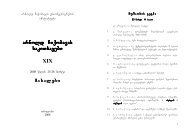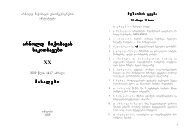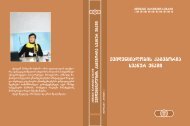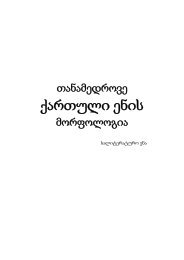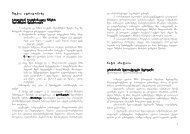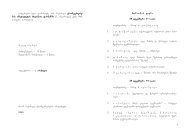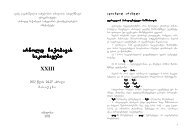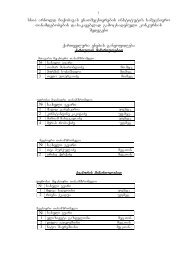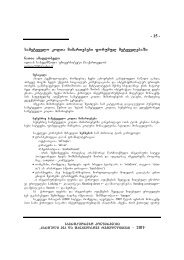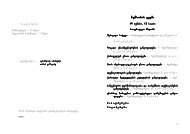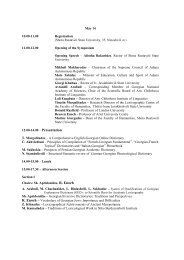5 r. a b a S i a (Tbilisi) bgeraTSesatyvisobis erTi rigisaTvis qarTvelur ...
5 r. a b a S i a (Tbilisi) bgeraTSesatyvisobis erTi rigisaTvis qarTvelur ...
5 r. a b a S i a (Tbilisi) bgeraTSesatyvisobis erTi rigisaTvis qarTvelur ...
Create successful ePaper yourself
Turn your PDF publications into a flip-book with our unique Google optimized e-Paper software.
Inserting into the necessary regime of functioning, these ways of wordformation<br />
differ from the common language (as well as other functionally<br />
marked) ways by their productivity and forms of the realization. The given<br />
precondition is based on the statement about the specificity of the display of the<br />
language typological parameters in different styles of speech [Jacobson 1966] ,<br />
[Bergelson 1990] and others.<br />
A survey of the works on word-formation in Lezgian (Gaidarov 1966,<br />
Suleimanov 2000, etc.) permits to consider that in this language, qualified as<br />
agglutinative with the elements of inflexion, the most widely spread types of<br />
word-building are suffixation and borrowing, prefixation and word-composition<br />
are used approximately in the equal degree, formation of non-free wordcombinations<br />
and semantic derivation are the next by productivity, abbreviation<br />
and other types of word-formation are not very much in use.<br />
As a result of the word-building analysis of Lezgian colloquialisms we<br />
came to the conclusion, that there is a different correlation between the<br />
employed ways of word-formation. The majority of colloquial units are formed<br />
by means of different means of word-composition. Compare the following pairs<br />
of stylistically neutral and colloquial synonyms :<br />
a) semantic composition (фад ‘soon’ – гила-мад “now + more”; рузи<br />
‘food’ – фу-яд “bread + water”; мирес ‘relative’ – хва-стха “son + brother”;<br />
кIватIал ‘meeting’, ‘crowd of people’ – гада-базар “boy + market” хизан,<br />
килфет ‘family’ – паб-аял “wife + child”, etc.),<br />
b) reduplication (яхдиз ‘on foot’ – кIвачи-кIвачи; са гужалди ‘hardly’,<br />
еле-еле’ – чIар-чIар; къастунай ‘on purpose’ – чиз-чиз and others),<br />
c) false reduplication, including a sound complex, which doesn’t exist in<br />
the language independently (кьулуьбур ‘small things’ – куьлуь-шуьлуь; луту<br />
‘swindler’ – луту-пту; къал ‘row’ – къал-макъал; аял ‘child’ – аял-куял;<br />
алвер ‘trade, commerce’ – алиш-вериш and others ),<br />
d) mixed way, containing reduplication and suffixation (чидай<br />
‘acquaintance’ – чирхчир; низамлудиз ‘periodical’ – вахт-вахтунда; суалар<br />
‘questions’ – жузун-качузун, etc.) .<br />
A considerable number of Lezgian colloquialisms are formed by means<br />
of borrowing from the Russian language. The peculiarity of the realization of<br />
this type of word-formation consists in adapting the borrowed words to the<br />
pronunciation and other norms of the Lezgian colloquial speech, on the one<br />
70



